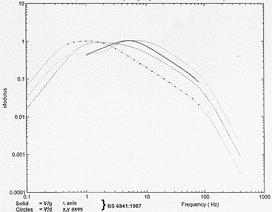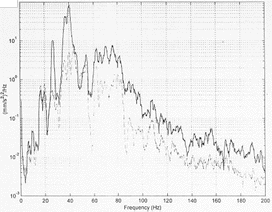Vibration
Vibration Sources
What Can be a Problem? The short answer is trains, and the bigger and faster can be the worst. However, despite their slower speeds, freight trains can be really difficult. Certainly road traffic does produce vibration, but is not normally problematic to a housing development.
Vibration due to trains is dependent upon many factors - including train speed and mass, rail smoothness, and the soil characteristics of the site. Although increasing the speed of a train can cause an increase in vibration and groundborne noise, the effects do not vary linearly. Strong vibration can arise if the excitation frequency associated with the sleeper passing frequency matches the natural frequency of the unsprung mass on the track/soil resilience. Because sleeper passing frequency increases in proportion to train speed, vibration may be more noticeable at certain critical train speeds. Sometimes this arises at a low train speed. Therefore a speed restriction at such a site would lead to higher vibration levels.
Human Response to Vibration. The figures below show example train vibration measurements and what is taken to be the average threshold of human perception to vibration.


Note that humans are generally more sensitive to low frequency vibration and that the vibration from trains tends to be dominated by low frequencies. This is particularly unfortunate for the house builder.
Within residential areas people exhibit a wide variation of vibration tolerance. For example, Parsons and Griffin (1988) report that there may be a 2:1 difference between perceptible and unacceptable vibration in the home, and a 5:1 difference between the most and least sensitive subject. Acceptable values depend upon factors such as; the sensation the vibration produces, what they hear and see, what they expect, a concern about damage to the building, whether they believe anything could be done to reduce the vibration and whether they anticipate that expressing their dissatisfaction is likely to achieve a reduction or some financial compensation.

